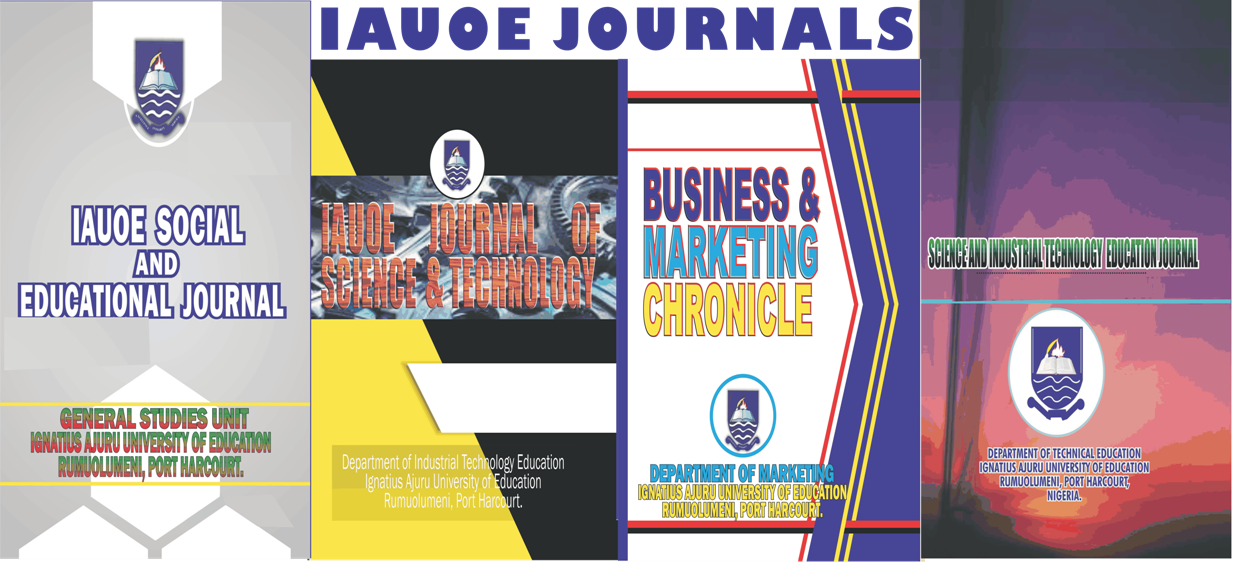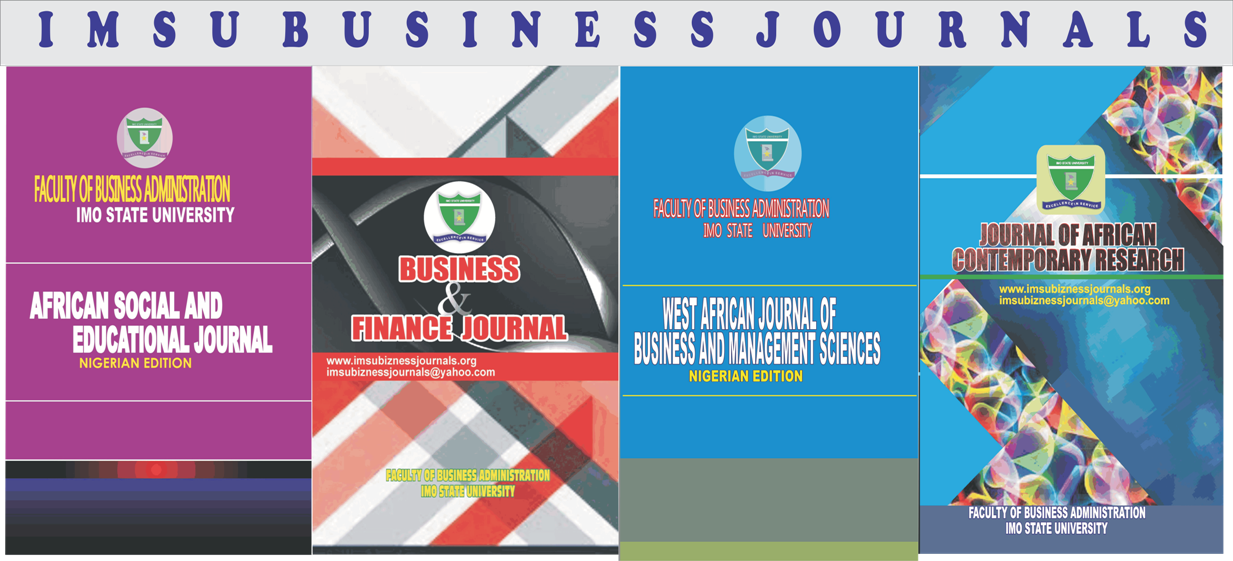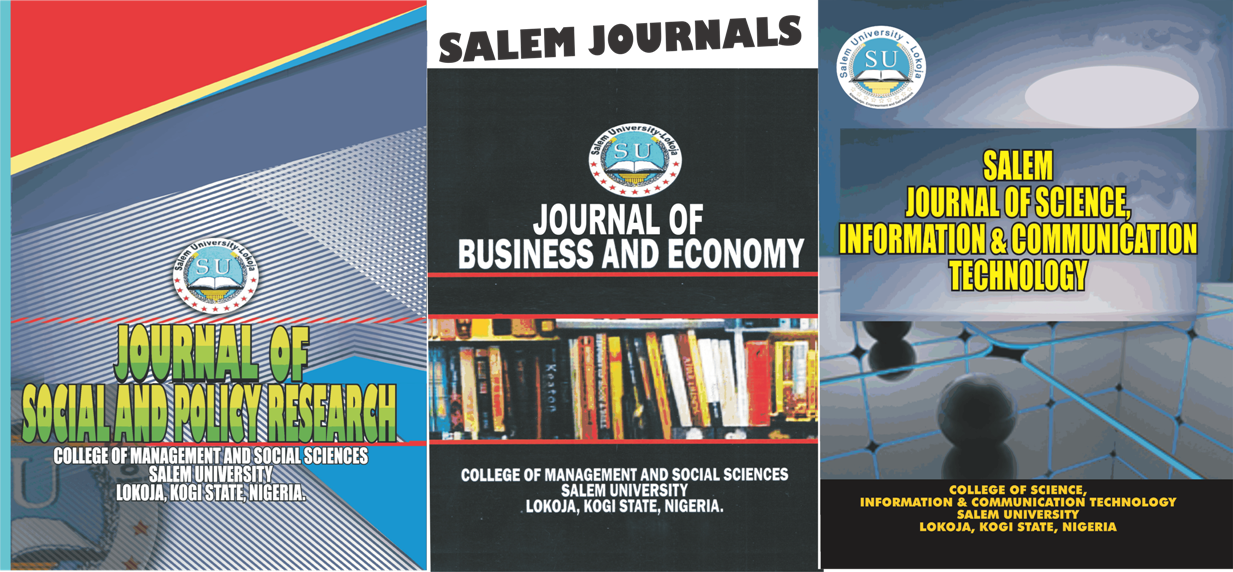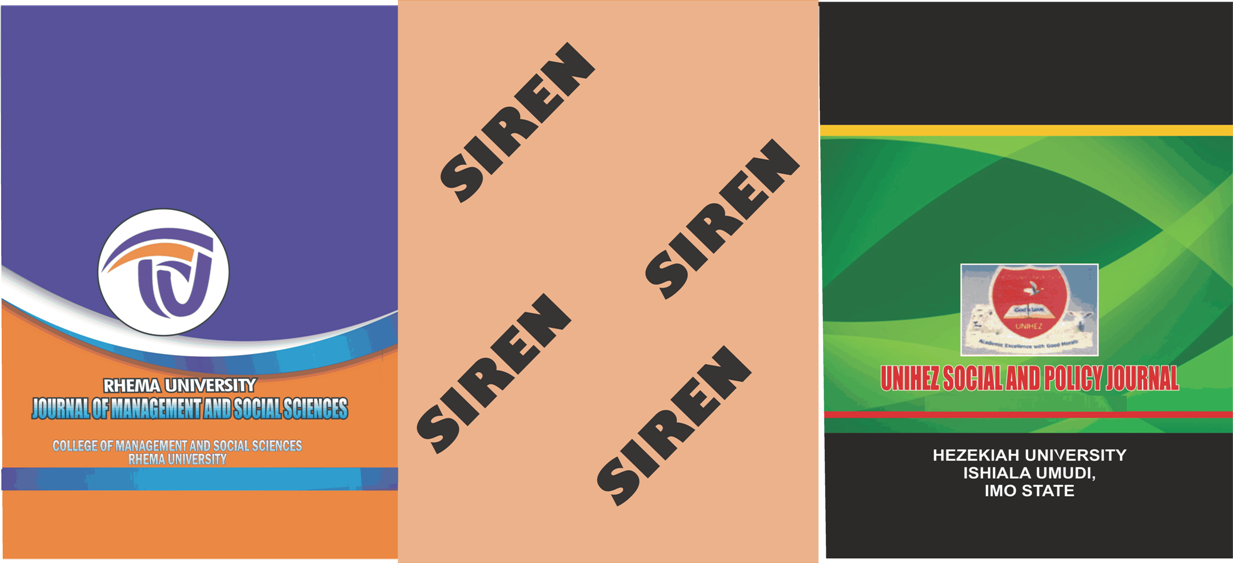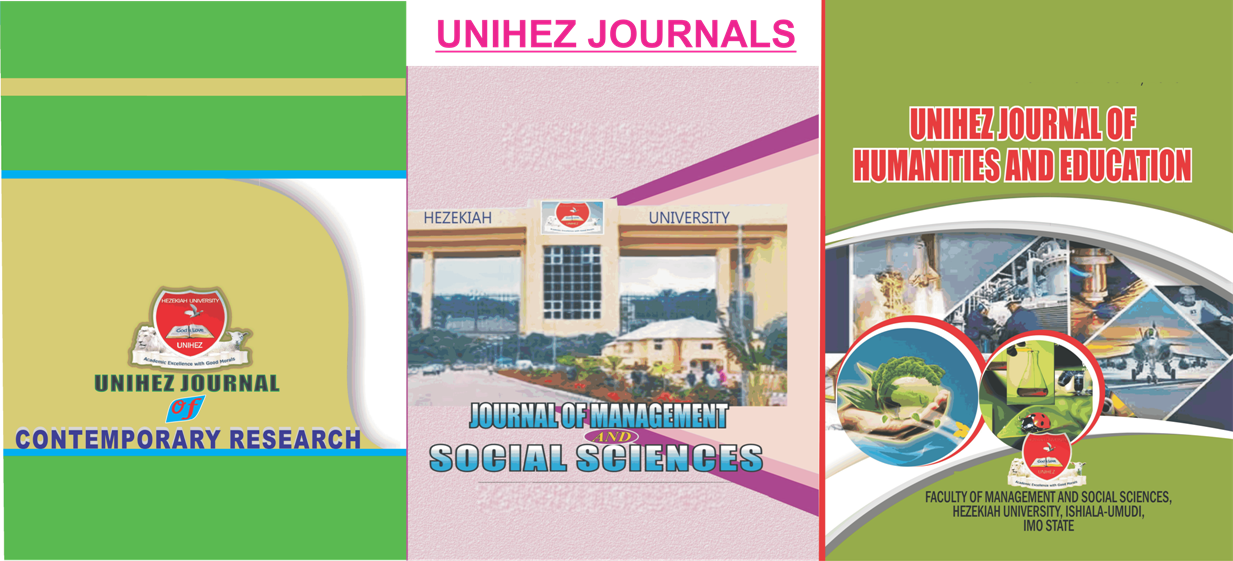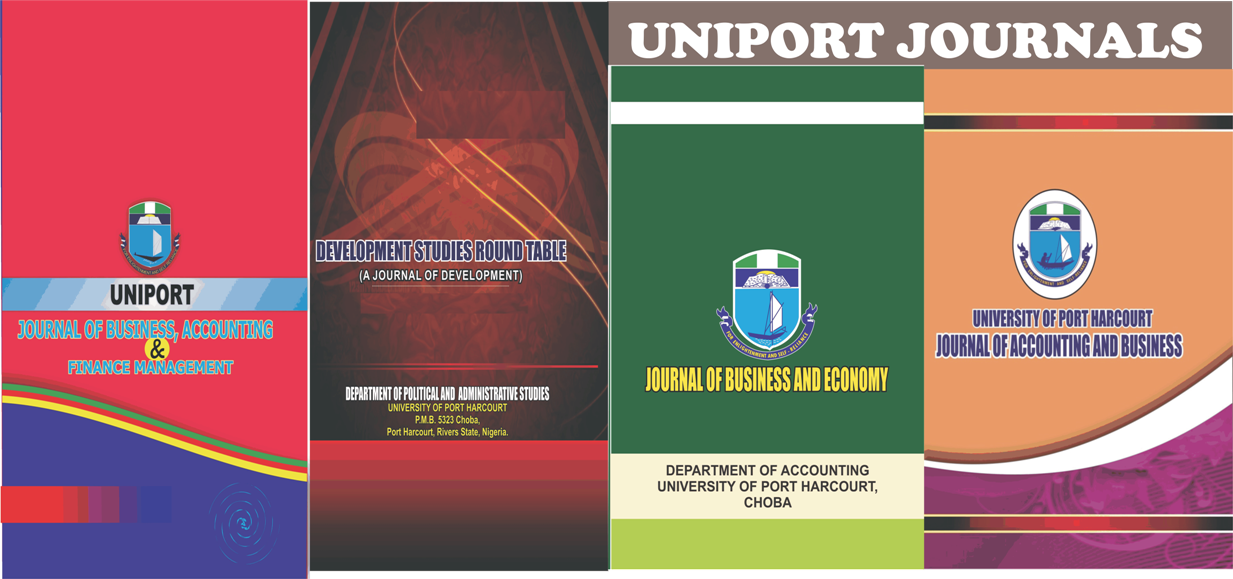2021 Archive
| 1 |
Title: AN ASSESSMENT OF TALENT MANAGEMENT STRATEGIES AND KNOWLEDGE CREATION, ON EMPLOYEES’ PRODUCTIVE CAPACITY IN THE NIGERIAN PUBLIC SECTOR.pdf Author: Ndudi Ejimofor Francis & Ononye Heman Uzor PhD. Abstract: Abstract This paper investigated the influence of talent management strategies (TAMS) and knowledge creation (KNC) on employees’ productive capacity (EMPC) in the Nigerian public sector. Specifically, we disaggregated TAMS into talent attraction (TAT), talent retention (TAR), career advancement (CAD), and talent development (TAD). Also, we examined the rifle effect of knowledge creation (KNC) process vis-à-vis socialization, externalization, internalization, and combination. Employees’ capacity to innovate was used to measure their productive capacity. Using the stratified sampling, a sample size of 300 employees in the Delta state ministry was used for the study with the help of research questionnaire. The sourced data was then analyzed using descriptive (frequencies and percentages) and inferential (Pearson correlation) statistics while tables were used to represent the sourced data. Inferences drawn from the study is that majority sturdily agreed positive strong relationship which exists between TAT and EMPC and between TAR and EMPC and between KNC and EMPC. Further, majority of the respondents agreed that frequent in-house development program, frequent coaching, E-learning and systematic trainings of employees are the most feasible ways through which management in the public sector can develop its employees. This was reaffirmed by the positive moderate relationship which exists between CAD and EMPC & TAD and EMPC. Hence, we confidently conclude that efficient TAMS are the best ways to enhance EMPC. In light of this, policy makers in the Nigerian public sector should ensure that their policies are tailored towards TAT, TAR, CAD, TAD, KNC, and enhanced EMPC. View |
| 2 |
Title: MODELING POLIC OPTIONS AN IMPERATIVE FOR MONETARY CREDIBILITY IN NIGERIA.pdf Author: EHIEDU, Victor C. PhD. Abstract: ABSTRACT The work modeled policy options (MPOs) vis-à-vis monetary and fiscal policies (MFPs) against monetary credibility covering 26 years spanning 1990 to 2019. Central Bank of Nigeria (CBN) Statistical Bulletin (2019) was the origin of data. Meanwhile, the sourced data was regressed using Econometric Views version 9.0. The study employed Auto Regressive Distributed Lag (ARDL). Methodology having subjected the work through unit root test, Akaike Information Criteria, ARDL bound test for cointegration) and diagnostic tests(Heteroskedasticity test, Breusch-Godfrey Serial Correlation LM Test, and Normality test). The ARDL Cointegrating and Long run result affirmed model fitness for prediction. Specifically, all economic policies except monetary policy (MP) rates exerted direct effect on monetary credibility. Public expenditure and monetary policy rate passed the test of statistical significant. Hence, it concluded that both public expenditure and monetary policy rate are instrumental to monetary credibility attainment though other economic policies like tax revenue, trade policies should not be undermined. In sustaining monetary credibility, government must ensure that her expenditures are more of developmental projects. Meanwhile, the Nigerian monetary authority must ensure that the current MP rate is reduced. Lastly, the current tax revenue, monetization ratio (broad money supply/GDP) and trade policies must be improved upon for improved monetary credibility. View |
| 3 |
Title: COVID 19 PANDEMIC ERA AND AUDITORS’ CHALLENGES.pdf Author: Owolabi, S.A. PhD. & Oyedele, Philips O. Abstract: Abstract The study looks at the obstacles faced by auditors during the Coronavirus pandemic and how to mitigate the effects of the outbreak on audit assignments. The study relied on a systematic review of related literatures and books to discover the challenges faced by auditors during the coronavirus pandemic era, which are categorized as going concern issues, audit evidence verification, subsequent event problems, audit risk, uncertainties, and scope limitation. According to the findings of the study, various problems could have a detrimental impact on the auditors assessment if not addressed appropriately and professionally. New modern remote auditing techniques and cloud accounting procedures using information and communication technology (ICT) instruments handled most of the issues during the pandemic era, thanks to the dedicated work of seasoned auditors and accounting and professional bodies. However, the study finds that installing ICT tools has its own set of issues, such as insufficient power and shortage of essential skills to utilize these tools among auditors. The paper suggests that auditing and accounting professional groups evaluate some existing standards to account for the level of uncertainty that a COVID 19 pandemic could bring. This assessment would aid auditors in re-strategizing for the post-coronavirus pandemic period. View |
| 4 |
Title: DEMAND FOR AUDIT MATTER ARISING.pdf Author: Owolabi Sunday AJAO PhD. & Jafaru Marughu Abstract: Abstract The value for audit need not be emphasized. Audit plays a key role in the resolution of the agency conflict and information asymmetry. The introduction of Joint Stock Company facilitated the supply of capital to support business enterprises. During this period, privately controlled enterprises gave way to the formation of limited liability companies. The suppliers of capital delegated the management of the companies to a body of directors known as board of directors. The directors periodically prepared and submitted accounts of stewardship on the state of affairs of the companies to the shareholders. It became necessary for the shareholders to derived assurance that the accounts prepared by the directors were freed from material errors and misstatements. The Companies Act of 1900 required the auditor to be an independent person. The Companies Act of 1948 added to it that an auditor should have a professional qualification. The demand for audit therefore arises when owners are separated from managers of a company. This paper examines the demand for audit and matters arising therefrom using exploratory design method. It recommends that audit will continue to be on demand as long as third parties manages business for their owners and that auditors should ensure that clients get benefits for their money. View |
| 5 |
Title: AUDIT FIRM CHARACTERISTICS AND FINANCIAL REPORTING QUALITY IN NON-FINANCIAL INSTITUTIONS IN NIGERIA.pdf Author: Atolagbe, Mujeeb Bolaji & Akintayo, Oluwatoyin Alex Abstract: Abstract This study investigated the effect of audit firm characteristics on the financial reporting quality of non-financial institutions in Nigeria for the periods 2014-2018. To achieve this objective, an explanatory research design was adopted to gather historical data from the annual financial statement of the selected non-financial financial for the periods in questions. In addition, from the 106 non-financial institutions firms in Nigeria stratified under seven segment of; Oil & Gas, Consumer Services, Consumer Goods, Basic Materials, Technology, Health Care and industries, a purposive sampling of 32 non-financial institutions were selected for the study. This comprised of 10% industry each from each stratum. Both descriptive and inferential statistics of Panel Regression analysis (in random effect) were adopted for the study. The result of the study revealed that audit firms characteristics had significant positive effect on the financial reporting quality of the selected non-financial institutions. It was concluded that audit firm independence, audit firm tenure, audit firm size, joint audit and audit fees were significant and positively related to the quality of financial reporting. View |
| 6 |
Title: SUSTAINABLE HUMAN CAPITAL POLICIES AND APPLICATION OF HUMAN CAPITAL IN BUSINESS ORGANIZATIONS.pdf Author: Owolabi, T J PhD., Tunde Muyideen & Musa, Abubaakar Abdullah Abstract: Abstract This study examines the sustainability of human capital policies, strategies, and the application of human capital in business organizations. The study reviewed past literature to identify empirical shreds of evidence on the uses and strategies of human capital policies. The paper presents empirical evidence of human capital and provides the usage of human capital in different sectors. The paper also identified strategic direction, goals, objectives, and implementation plan and communication plan as the main components of human capital strategies. View |
| 7 |
Title: INFORMATIVE CONTENT MANAGEMENT AND STRATEGIC MARKETING FOCUS ON.........pdf Author: ODITA ANTHONY OGOMEGBUNAM PhD. Abstract: Abstract In a dynamic changing competitive business environment business firms have been forced to rethink how they market and sell their products and services. It thus appears that informative content management is what every marketing program needs to create leads that drive revenue. The general objective of the study was to examine the effect of content marketing on customer engagement. The study adopted the survey research design method. The study made use of a sample size of 274 staff from some selected firms in the Non Alcoholic Beverage Industry in Lagos State, Nigeria of which 259 was found usable. Descriptive statistics (frequency tables, percentages) were used to analyze the questionnaire response and pattern the responses from each of the constructs in the study using likert scale. Multiple regression analysis was employed to analyze the effects of the components of content marketing, information quality, content marketing channels, content co-creation and message source credibility on customer engagement. Findings showed that all latent variables have significant effect on customer engagement in the Non Alcoholic Beverage Industry. The study recommended that to maintain brand credibility an enterprise must enable quality information and co-creation of content with the customers. The study established that content co-creation appears to have the highest positive effect on customer engagement in the Non Alcoholic Beverage Industry in Lagos State Nigeria. View |
| 8 |
Title: PIPELINE SURVEILLANCE CONTRACTS AND THE EMERGING OIL-RELATED CONFLICTS IN RIVERS STATE, NIGERIA.pdf Author: Sekibo, Rowland Charles & Nte, Timothy Ubelejit Abstract: Abstract The award of pipeline surveillance contracts (PSCs) to ex-militant commanders has set the basis for a new wave of on-going conflicts in Rivers State. These lucrative PSCs constitute a new arena of ‘do or die’ struggles between and among ex-militant, cult, gang, vigilante groups, violence business people, community organizations, state actors and politicians. This article examined the effects of these PSCs by Transnational Oil Corporations and government agencies on recurring oil-related conflicts in Rivers State from 2009 – 2021. The Marxian political economy approach was employed to guide data collection and analysis. It relied on secondary data collected from libraries, national/international agencies and internet resources. The contents of the secondary data collected were analyzed to describe how the PSCs to ex-militant leaders have generated on-going armed struggles between beneficiaries and non-beneficiaries over the control of oil pipelines in Rivers State. It was observed that the lack of local communities’ partnership in Nigeria’s oil industry necessitated the existence of PSCs to ex-militants as ‘payments for peace’ and to prevent oil sabotage and theft. However, instead of achieving this purpose, existing PSCs have ensued conflicts, pipeline vandalism and oil theft. It was accordingly recommended that, among others: local communities should be involved in pipeline surveillance – they should be given at least 45 % of the PSCs and 55% to professional competent firms. A standing ‘Community-Security Consultative Committee’ comprising all stakeholders should be set up to amicably address and resolve issues. View |
| 9 |
Title: EFFICACY OF GOVERNMENT FUNDING STRATEGIES AND MSMEs PERFORMANCE IN NIGERIA AN EMPIRICAL ANALYSIS.pdf Author: Andrew O Agbada, PhD. Abstract: Abstract This study seeks to empirically analyze how government funding strategies have influenced or leveraged performance of Micro, Small and Medium Enterprises (MSMEs in Nigeria. It examines the effectiveness of government funding strategies on the various categories of businesses and to enable us take a decision on the level of impact the funds have had on their performance. Data were sourced by means of structured questionnaire with answer options arranged in a Likert 5-point rating scale showing respondents agreement or disagreement ranging from Strongly Disagree, Disagree, Neutral, Agree to Strongly agree and the response options were weighted 1, 2,3, 4 and 5 respectively. Data obtained were presented in a table and Pie charts and were empirically analyzed by Pearson Product-moment correlation coefficient (r). Findings from the empirical analysis were robust. The r value for MSMEs businesses stood at - 0.911, - 0.883 and 0.751 respectively. The large positive r value for Medium scale firms reveals a clear distinction that by natural competition, a large number of the facilities provided by government are being usurped by them because of their vantage position of being relatively large, an indication too, that they are capable of growing on their own. The empirical results also reveal the acute financial deficiency of Micro and Small scale businesses with minimal survival chances. We therefore recommend that Medium scale firms should be eliminated from MSMEs category to enable government focus on Micro and Small enterprise (MSEs), the core base engines of the economy. This way, their survival rate will be improved upon with implication to garner ability for creating more employment and adding maximally to national income View |
| 10 |
Title: IMPACT OF DYNAMIC MODEL FOR BANK LIQUIDITY ON PROFITABILITY TRADE OFF (2).pdf Author: JAMES AGBEKEME SARAKIRI PhD. Abstract: Abstract Liquidity provides a buffer to a bank against insolvency but an excess has a tendency to adversely affect profitability chain. In view of this, I employed data on Nigerian banks for an empirical analysis of the evolution of a turning point in profitability distribution and establish a tradeoff in a model. Consistent with empirical evidence, acid test, current ratio and loans to deposits ratio as measures of liquidity have negative effects on net profit margin being a proxy for profitability significant only at 10 percent level. These findings suggest that continuous increase in liquidity does not result in continuous bank-profitability. View |
| 11 |
Title: AN EVALUATION OF FOREIGN DIRECT INVESTMENT ON ECONOMIC GROWTH IN NIGERIA (1980 - 2009).pdf Author: Ajagbe, F. A. & Olaifa, O. I. Abstract: Abstract This paper examines the evaluation of Foreign Direct Investment (FDI) on economic Growth in Nigeria(1980 - 2009). The model used by Balasubramanyam(1996) was adopted and adjusted to include variables like: inflation, foreign debt, exchange rate and political dummy. The Ordinary Least Square(OLS) estimation techniques was employed. The results revealed that the coefficient of determination( R2 = 87.5481) shows that the explanatory variables explained a total variation of about 88% in the dependent variable(GDP) while the remaining 12% is caused by the error term in the model and the result exhibits good fit and signs of reliability. The result is statistically significant at 5% level of probability. The DW (2.026787) shows absence of autocorrelation in the model. Hence, it was concluded that exports, exchange rate and political factor form the major locational factors of FDI in Nigeria. Based on the conclusion, it is therefore recommended that Nigeria should encourage improved domestic investment to accelerate growth to compliment FDI as a prime mover of the economy and a stable government should ensure sustainability of democratic rule devoid of unwarranted changes. View |
